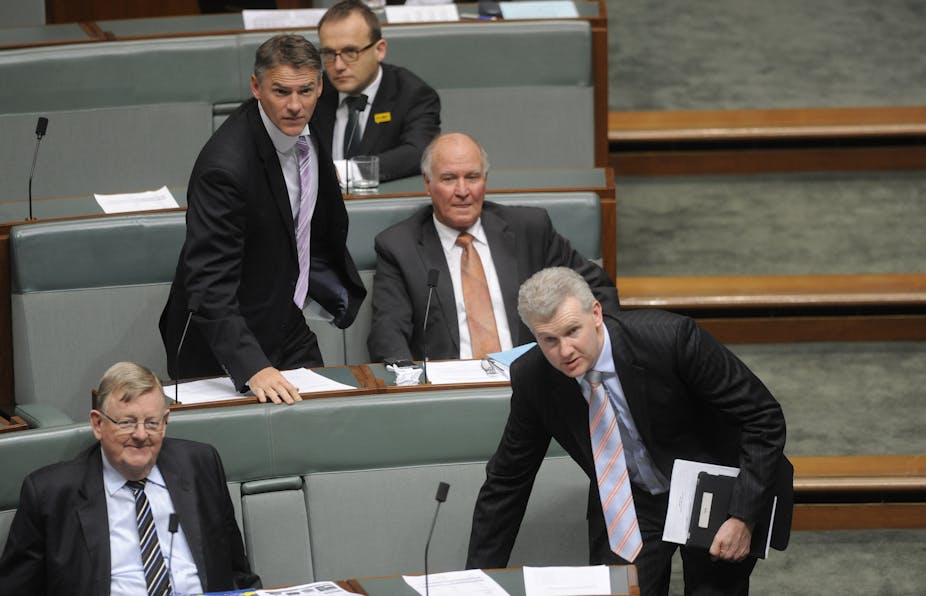The forthcoming Australian election will be a critical one for the environment.
The most urgent issue is climate change. We are already seeing the social, economic and environmental impacts of about one degree increase in average temperature. The possible impacts of two degrees are frightening enough, but we face the possibility of even greater increases if the world fails to take concerted action.
As the worst polluter per person in the developed world and a major exporter of fossil fuels, we have a critical responsibility.
It is crucial for the next government to take considered advice from the Climate Commission on the scientific basis for our reduction targets. While it is a step in the right direction to have a modest charge on polluters, the initial level is too small to make the sort of difference that is needed by itself. There are too may concessions to polluters, too many exemptions from the charge.
We should be urgently phasing out all subsidies of fossil fuel supply and use. These don’t even make economic sense and are environmentally disastrous.
We need concerted programs to promote renewables and to improve the efficiency of turning energy into the goods and services we use. The Howard government’s National Framework for Energy Efficiency showed we could cut pollution by 30% using measures that pay for themselves within four years.
This is not low-hanging fruit, it is fruit lying on the ground. These changes provide economic benefits as well as slowing climate change.
Urgent attention needs to be given to urban transport. The carbon charge does not apply to transport fuels, and successive governments have failed to modernise public transport, so more and more commuters are driving longer distances in large and inefficient cars. Even the US government now has serious targets for improving vehicle efficiency. We should be moving rapidly to reflect world’s best practice, rather than continuing to be a dumping ground for out-of-date technology.
Recognising that we now contribute more to the problem of climate change through our fossil fuel exports than all domestic energy use put together, we have a responsibility to take action. It is just irresponsible to be encouraging expansion of fossil fuel exports for short-term economic gain, especially as most of the companies benefiting from that expansion are not even Australian.
There are other serious environmental issues that should be addressed by the next government - and considered by voters when we help to choose that government.
A tentative start has been made to restore the health of our greatest river system, the Murray-Darling, but the momentum of reform needs to be continued and accelerated. The Tasmanian forest agreement is still not secure, the Great Barrier Reef is under increasing pressure both from activities onshore in Queensland and frightening numbers of freight vessels, and we are still losing our unique biodiversity.
We hear ridiculous calls to wind back “green tape”, dishonestly suggesting that over-zealous environmental regulation is impeding economic development. That campaign has led to some state governments doing a Great Leap Backwards, as when Queensland moved to scrap Wild Rivers protection in the Channel country and Victoria tried to let cattle back into the Alpine national park. These examples show how critical it is for the Commonwealth government to maintain its capacity and political will to hold short-sighted state governments to account.
While it is obviously important for the Australian government to have responsible environmental policies, it is even more important to address the driving forces that are causing environmental degradation. The first independent national report on the state of the environment stated that population growth and lifestyle choices, including increasing consumption, are behind the environmental problems.
We urgently need a national government that has a vision for a future sustainable Australia, rather than the irresponsible headlong pursuit of growth. We know that growth cannot continue for ever in a finite system.
We should have a national conversation now about the trade-off between population and quality of life. Survey after survey shows that the community understand we are losing socially and environmentally through the short-sighted obsession with growth. We should be aiming to stabilise the population by reducing immigration levels, as well as introducing policies to limit consumption to levels that can be maintained.
The current approach is funding our material consumption by destroying our natural resources, effectively stealing from our own children. That is morally indefensible and doesn’t even make economic sense. We need a government that will act responsibly to secure our future!
These are the critical issues which will determine our future, but most political candidates are either blissfully unaware of them or totally reluctant to discuss them. The 2010 election was dominated by personality politics, economic trivia and mud-slinging. We are entitled to demand more from those who aspire to lead us.

